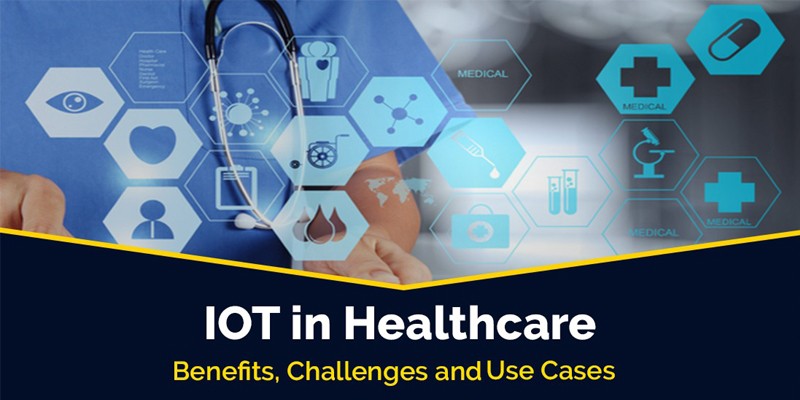The healthcare sector is undergoing technological advancements particularly in the field of app development solutions and services. For instance, Artificial Intelligence, Machine Learning and Augmented Reality and the Internet of Things or IoT are making in-roads in the healthcare industry in big way. The IoT is being executed and implemented the most in the healthcare sector as indicated by some reports of Aruba Networks – a subsidiary of Hewlett Packard.
The challenges in the healthcare industry have resulted in new prerequisites for healthcare service providers in effectively conveying or providing excellent medicinal and healthcare services.
The IoT with its set of advantages is helping patients and the medical fraternity in understanding the ailments and in tracking the progression or stages of the diseases. A multi-disciplinary group of IoT in healthcare services is resulting in cooperation between the patient and the medical staff.
The principle stage of IoT application starts when the patient makes their call to the clinic for getting an appointment or on a personal visit in case of an emergency. Thereafter, the ongoing examination of the patient’s condition with clinical devices linked to the mobile applications, medical service suppliers to gather the information that a doctor can use to examine the patient’s condition and plan better treatment establishes a fertile ground for using IoT.
Applications of Internet of Things in Healthcare –Healthcare providers can consistently use the IoT data gathered from the application for the following purposes such as-
Empowering interminable patients to track, screen, and in measuring their well beingUndertake research studies that include assessing therapeutics, contrasting treatment impacts, estimating useful recuperation in patients etc.
Assets and resource utilization that include assessing diagnostic tests and methodology performed, finding service measurements, overseeing prescription utilization.
Quality assessment such as patient outcomes, patient readmission rate, patient fulfillment and satisfaction studies and emergency clinic quality measures.
The IoT clinical devices when incorporated with intelligent and associated gadgets can be utilized to screen the patient health and be able to raise alerts before the beginning of an infection or disease. In patient care, the IoT can be applied to devices such as-
WearablesMedical devices
Active passive labels
Wearables screen the well being state of the patient by taking readings and then sending caution or alerts when required so that this information can be utilized for concluding or to improve treatment and upgrading clinical care. Active passive labels when worn by the medical staff, patients, and guardians and incorporated into identification cards can help in decreasing the time taken in providing the services and in better administration of the assets.
Medical devices and gadgets on the other hand, follow the utilization of the hardware for every patient and contrast the information to check their status. These wearables work in a coordinated manner following a framework to help healthcare service providers. The core benefits of using IoT in the healthcare system includes-
Simultaneous Reporting and MonitoringHelpful in Data Assortment and Analysis
Tracking and alerts
Providing End-to-End Connectivity and Affordability
Providing Remote Medical Assistance
Areas in which IoT can be applied in the healthcare system-
IoT has the potential to change the way of the path of healthcare service industry in a big way with top IoT app development companies providing IoT applications in healthcare services across the healthcare chain in areas such as-
IoT for patientsIoT through wearables and remotely assisted gadgets can help patients in following up their disease or sickness treatment through the data emitted to and from the gadgets.
IoT for insurersFor insurers, IoT helps in identifying the data derived from hardware in identifying extortion guarantees and keep up to date data for patients by healthcare insurance agencies.
IoT for doctorsThrough IoT, physicians can get information gathered from the wearables and other clinical gadgets for monitoring patients well being with regards to their IDs thereby providing the best treatment processes for the patients.
IoT for healthcare service providersIoT sensors when introduced to various clinical gear or equipment such as wheelchairs, nebulizers, oxygen siphons, defibrillators etc can help healthcare service providers in improving or providing value added services.
Challenges faced by healthcare service providers when using IoT
There exist four major challenges when using IoT applications or apps that include-
Data security and privacyThe data stored inside the IoT devices may be susceptible to hacking by cybercriminals resulting in data theft or compromising of individual well being data.
Data overload and accuracyIoT gathers information in a big way resulting in data overload and difficulty in isolating the essential bits of information for the investigation. Overloading of the information or data may influence the decision making process in the long run.
CostThe expenses incurred in the adoption of IoT application development are phenomenal with a lot of investment needed in building up the assets for IoT application. However, there are possibilities of opening up new business avenues resulting in more income streams by adopting IoT applications.
Finally, it can be concluded that the adoption of best IoT applications in the healthcare sector results in cost reduction while providing social insurance, engaged medicinal service suppliers and best medical care provided to the patients.
Visit our site: https://reliantvision.wpengine.com/
Call : (855)-420-8248
Email : info@reliantvision.com

